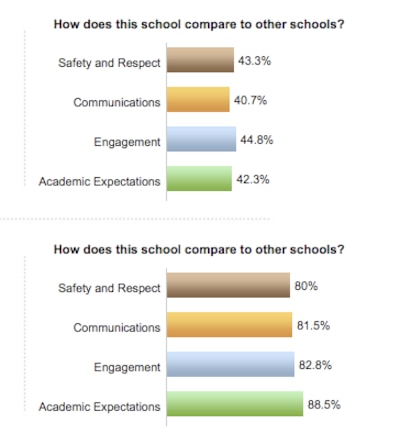
Out of all the criticisms that have been hurled at the Department of Education’s accountability regime, there’s one that I don’t think even the DOE would dispute: The reports that explain every school’s grade, review, and survey results are too hard to find.
To fetch these documents, a parent or principal or poor old reporter must first traverse a maze of Web links. Then she must risk possible system crash to open the PDF documents that house the reports. And please do not consider comparing two different schools’ grades or even one school’s grade over two different years. Before you know it you will have too many windows open and think about something else, like maybe a cookie.
This week, officials made a move to change that, launching a new online tool called SurveyQuest that allows users to sift through the results of surveys given to parents, teachers, and students at every school. SurveyQuest also offers a tool that allows users to compare two different schools.
The idea, according to spokesman Andrew Jacob, is to give principals a way to find schools that might help them improve. Say, for instance, your school scored poorly on the communications portion of the survey. You can search for a school with a high score and call that principal for advice.
Jacob says the tool is also meant to help parents and students find a good school for them. The big book of high schools can make it hard to compare schools’ results, but SurveyQuest, Jacob said, is a way for a parent to place the opinions of families at two different schools side-by-side, instantaneously. Eventually, the tool could expand to include information from the progress reports and quality reviews, too, Jacob said.
There could definitely be a big Achilles heel here, though, which is the quality of the survey information. The surveys, called Learning Environment Surveys, are the Bloomberg administration’s new way to pry information from, ideally, every single teacher, parent, and student in the city. The surveys ask a battery of questions about a school, from the quality of its art projects to how high it sets academic expectations. The results make up a small part of a school’s progress report grade, so that if many parents and students are unhappy, the school loses points.
But some critics have challenged the surveys’ validity. If survey results could cause a school to get an F or even get shut down, why, they ask, would parents and teachers feel comfortable answering the questions honestly? Indeed, the New York Post reported last year that a set of about 60 principals were advised last year to steer the surveys away from “toxic” people who might judge the school poorly. Others have accused the surveys of asking an incomplete set of questions. Public Advocate Betsy Gotbaum has dismissed the survey results as pure p.r.
But the DOE has maintained its faith in the survey results. And in a new paper, the economist Jonah Rockoff at Columbia, who is studying the Bloomberg administration’s school accountability measures, finds evidence that the results are probably accurate, at least among parents.
